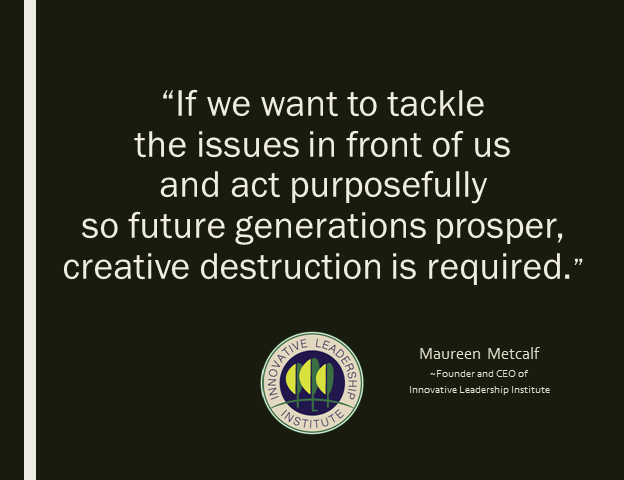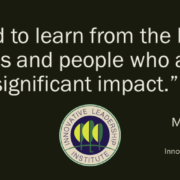6 Key Recommendations To Address Current Business And Social Challenges
 The following blog is a republish of an article appearing in Forbes written by Maureen Metcalf. It is a companion to the International Leadership Association Interview Series beginning this week with Pat Dambe’s podcast titled Sustainability and Corporate Citizenship.
The following blog is a republish of an article appearing in Forbes written by Maureen Metcalf. It is a companion to the International Leadership Association Interview Series beginning this week with Pat Dambe’s podcast titled Sustainability and Corporate Citizenship.
I have attended the International Leadership Association (ILA) annual conference for the last five years and have written about what I’ve learned during this experience. The twenty-first conference was held in Ottawa, Canada. The theme was “Leadership: Courage Required.”
I was named a fellow of the ILA in 2019. This article reflects my experience with the presenters and participants at the conference. I share this experience with you because I value the insights I gain, and I believe that we, as leaders, need to come together in our thinking and actions to influence our organizations. To do this, we need to learn from the best models, frameworks and people who are already making a significant impact. We need to cocreate the future we want to leave for generations that follow.
The conference opened with a reception at the Canadian Museum of History. Considering the entire arc of history, we are walking the planet at a time when our actions have a disproportionate impact on the future. Early people impacted us, and what we do will have a larger legacy. The principle among many indigenous peoples that this consideration should extend to the next seven generations reminds us our actions matter in the long term.
- We are continually hearing about polarization, the strengthening of the extremes and subsequent weakening of the “middle” or more balanced ideas. I left the conference reenergized because of the research and the actions I saw to reduce polarization and rebalance our companies, communities and countries. This can be done by bringing constituents from for-profits, governments, co-ops, nonprofits, nongovernment agencies and others together to address our biggest challenges. I recommend continually seeking out people with different points of view when you are making difficult decisions and actively working to understand what smart people who perceive the world differently see that you may have overlooked. Below are lessons from people who are solving these problems in their contexts.
A great example of this model playing out is the partnership between a large jewelry company and the government of an African nation, as discussed by a conference panelist. Diamond mining is funding a major investment in the country’s ability to build infrastructure, educate the population and grow 21st century business ventures. This case study illustrates that the theoretical framework is transforming a country in Africa. If it can work at this scale, it can certainly work on a smaller scale in our communities and companies.
- Another example of bridging significant societal differences is the Truth and Reconciliation Commission of Canada. The commission documented the historic abuse of indigenous children in residential schools and offered 94 Calls to Action for all levels of government to take to repair the harm done to indigenous peoples and create space to move forward with reconciliation. Answering these calls requires a great deal of work to build trust and take the best interests of the overall country into consideration along with the interests of individual constituent groups. While most of us aren’t involved in redress for abuses, I recommend we take to heart the spirit of truth, respect and fairness to all people. Different people with different perspectives create stronger solutions to complex problems.
- Innovation happens when we are curious about difference, yet research indicates that about half of those surveyed don’t want to follow a leader who was a different gender, ethnicity or sexual orientation. The unwillingness to follow a leader of a different political party goes up to about two-thirds. To me, this data is a call to action — we need to see differences as the opportunity to build a more innovative and holistic future. If we discount people or don’t understand their perspectives, we create less robust solutions. We all lose!
- Women in leadership are an integral part of business and society. In addition to numerous panels, presentations and workshops led by women, we heard from the first female prime minister of Canada and several successful female leaders and businesswomen, two of whom received lifetime achievement awards.
These women were the first in their organizations and have worked tirelessly for decades to continue to impact their fields. They serve as advocates, role models and people who break stereotypes. They exemplify what is possible when we stay committed to our purpose and work together to ensure we can create a better world. We have read for years now that the inclusion of women is required to deliver innovative and robust solutions to challenges and bottom-line results. We have many female role models to inspire us with their experiences.
- Peace starts from within. It is contagious. We can build peaceful organizations when we start small, with how we manage our own feelings, as well as starting big with significant research about what creates peace in our evolving world. The process of being self-aware, managing our emotions and meeting anger with curiosity is key.
- Character can be defined and measured. During a time when many of us are disappointed in the leaders and institutions we have trusted, there are robust frameworks and models that offer organizations a way to talk about leadership character, hire for it, test it and develop it. If the saying “What gets measured gets delivered” is true, it is important to have these measurement tools to provide us a path to elevate the conversation about character.
If we want to tackle the issues in front of us and act purposefully so future generations prosper, creative destruction is required. We need to disrupt ourselves, our mindsets, our behaviors, our cultures and our systems if we are to cocreate the future that is possible for all of us. The inspiring news is that we have thought leaders, academics, business leaders, public sector and nonprofit institutions and political leaders aligned with solving issues. Who is serving as a model in your life to move forward?
About the Author
Maureen Metcalf, CEO of the Innovative Leadership Institute, is a renowned executive advisor, coach, consultant, author and speaker.


Leave a Reply
Want to join the discussion?Feel free to contribute!